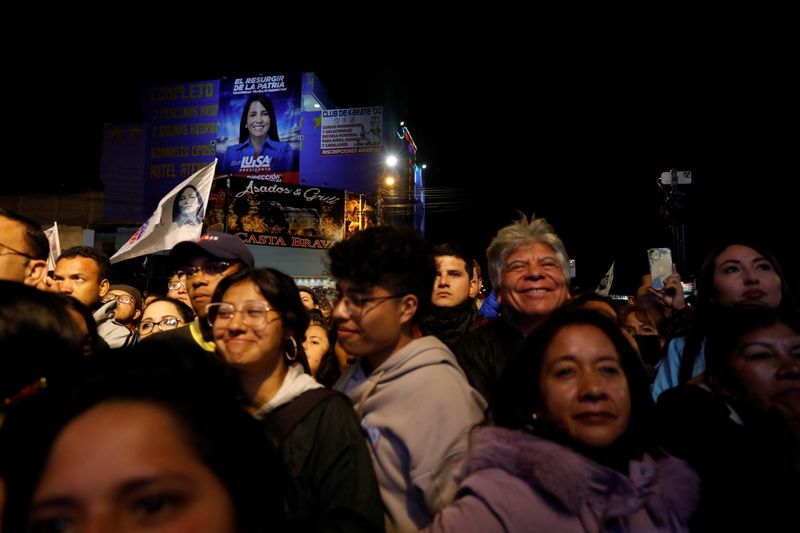Ecuador candidate backed by Correa will face banana heir in second round
2023.08.21 03:04
2/2

© Reuters. Supporters of Ecuadorean presidential candidate Luisa Gonzalez gather during a presidential election night event, in Quito, Ecuador August 20, 2023. REUTERS/Karen Toro
2/2
By Alexandra Valencia and Julia Symmes Cobb
QUITO (Reuters) – Two former lawmakers, leftist Luisa Gonzalez and business scion Daniel Noboa, will battle for Ecuador’s presidency in an October run-off, after coming top in a first round of voting over the weekend.
Gonzalez, a protege of former President Rafael Correa who has promised to revive his social programs, won 33% support, while Noboa, son of prominent banana businessman and former presidential candidate Alvaro Noboa, was a surprise second-place with 24% of the vote.
The contest was darkened by the assassination of anti-corruption candidate Fernando Villavicencio earlier this month. The crime is still under investigation, but Villavicencio, who was replaced as a candidate by his friend and fellow investigative journalist Christian Zurita, came third with 16%. Villavicencio’s name appeared on the ballot papers because they were printed before his murder.
Sharp (OTC:) increases in crime, which the current government blames on drug gangs, and the struggling economy, whose woes have caused a rise in unemployment and migration, were the top concerns among votes as they headed to the polls on Sunday.
Gonzalez has promised to free up $2.5 billion from international reserves to bolster Ecuador’s economy and bring back million-dollar social initiatives implemented by Correa – who has since been convicted of corruption – during his decade in power.
Noboa seemingly gained support after performing well in the only televised debate of the campaign.
A lawmaker until current President Guillermo Lasso dissolved the national assembly and called early elections, Noboa has focused his campaign on job creation, tax incentives for new businesses and jail sentences for serious tax evasion.
Though Noboa is likely to look for alliances with candidates who have been knocked out of the race, any potential victory will depend on how well he articulates policy proposals, said political analyst Alfredo Espinosa.
“Noboa has tried to sell himself as a businessman and a young technocrat. He showed it when he talked about how to manage hydroelectric dams (during the televised debate),” said Espinosa. “If he can do that same exercise with the proposals of the (other) candidates that will give his rhetoric much more meaning.”
“Politics is not comparable to managing a private business, it means generating consensus, generating spaces for dialogue,” Espinosa said.
Gonzalez, backed by Correa’s political machine, which has devoted loyalists, especially in working class sectors, is in a strong position as the “second round will be plagued with ideological content,” the political analyst said.
Also on Sunday’s ballot were two environmental referendums that could block mining in a forest near Quito and development of an oil block in the Amazon (NASDAQ:).
An effort to bar development of an oil block in the Yasuni reserve in the Amazon was winning 59% support, with about 37% of ballot boxes counted, while a ban on mining in the Choco Andino forest near Quito was also winning with 67% support.
Correa’s Citizens’ Revolution party was leading the count for seats in the national assembly, with about 40% support, while Villavicencio’s Construye party tallied 22%, with about 57% of ballot boxes counted.








